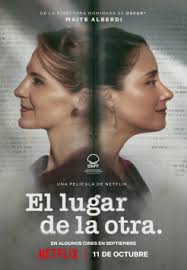
IN HER PLACE/ EL LUGA DE LA OTRA
Chile, 2024, and 89 minutes, Colour.
Elisa Zuleta, Francisca Lewin, Marcial Tagle, Pablo Macaya.
Directed by Maite Alberdi.
This crime and legal drama is based on actual characters and events, 1955, a writer killing her lover publicly in an exclusive hotel in Santiago.
It has been written and directed by Maite Alberdi, documentary filmmaker (Oscar-nominated for The Mole Agent).
However, the film focuses on a judge and his being appointed to interview all the witnesses as well as the accused, to make a judgement for a prison sentence, and the focus on his legal assistant, Mercedes, an intense performance by Elisa Zuleta. The film offers background to Mercedes’ character, her ordinary life, financial struggles, her husband a commercial photographer, two sons at home. However, working with the judge, her life is open to all kinds of interesting experiences, encounters, different ways of assisting the judge in his enquiries.
The meaning of the title becomes clearer when Mercedes is asked to look into the accused’s apartment, getting the key, becoming absorbed, infatuated, continually returning, wearing the accused’s wardrobe, her perfume, becoming more and more at home, even in an encounter with a previous lover of the accused who finds her in the apartment. She continually watches the accused, giving her cigarettes, and eventually sent to photograph the Good Shepherd institution where the accused is lodged.
Not only is Mercedes in her place in terms of psychological identification with the accused, but literally in her place, in the apartment.
Mercedes needs and wants a break from the noise at home, her snoring husband, her rowdy children, her talkative extended family, her husband eventually following her to the place and discovering her secret and what she wants.
Meanwhile, the author writes a book in her confinement, and it emerges that she was imitating an actual story 1941 about a previous England author, a similar killing, and her eventually being pardoned.
And, a final drama when one of Chile’s most eminent poets write a letter to the president and effects a pardon for the accused, Mercedes having to move out, watching the freed woman return to her apartment.
What we have watched the accused with great interest, most of our attention is on Mercedes and the intensity of her psychological behaviour.
- The title, Mercedes and her identification with the author, psychological and identification? But her literally moving into the apartment and living her life?
- The 1955 setting, society, the hotel, the women going inside and only on invitation, the situation, the author, shooting her lover, the blood on her face, escorted out, the media, shouting, photographed, extensive stories about her drinking the blood of her victim…?
- Mercedes, her character, at home, her snoring husband, getting up, breakfast, her sons, the confined living space, her husband and his customers, the photos, Mercedes welcoming the customers? The contrast with her going to work, in the legal office, with the judge, the team, the judge relying on her, her contributions to the investigation, typing, the judge and the interviews?
- The accused, the judge and his interrogations, her lack of collaboration? The issue of her being held, bail, prison, her going to the Good Shepherd institution, with the other prisoners, the nuns? Mercedes identifying with her, looking, judging her guilty, the cigarettes?
- Mercedes, going to the apartment, to get the clothes, looking in the mirror, identifying with the accused, her going back to the apartment, the wardrobe, the perfumes, reimagining the life there, her continued returning, literally in the place of the accused?
- The progress of the case, the lawyers, the witnesses, the brother of the murdered man, the sister of the killer, the different perspectives?
- Mercedes, typing, observing, going home, staying at the apartment, her husband’s concern, the big family gathering, her finding it oppressive, her husband following her, discovering, staying the night?
- Mercedes asked to photograph the Good Shepherd institution, her visit, the discussions with the accused, the range of photographs, the accommodation, herself?
- The final judgement, the sentence, 541 days?
- The poet, the appeal to the government, the granting of the pardon?
- The consequences for Mercedes, having to move out, watching the accused return home?
- The portrait of Mercedes, her ordinary life, the exhilaration of her legal work, the identification with the accused, living another life, her future?